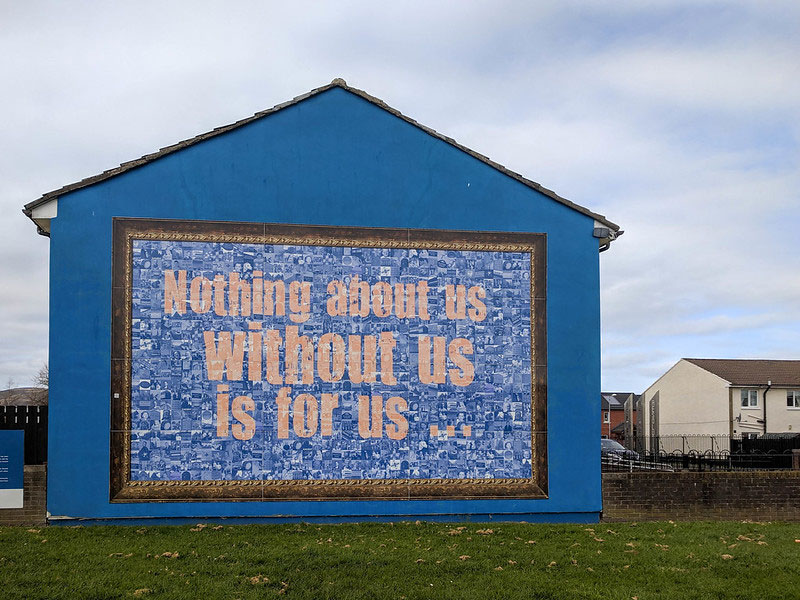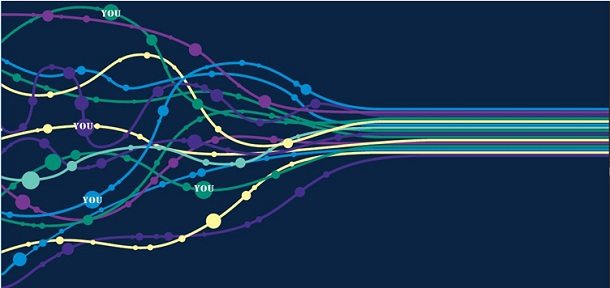
NPQ: Building the Intelligence of the Sector through the Intelligence of the Sector
“Like a cup of strong coffee first thing in the morning, the NPQ daily e-mail wakes me up, often to new ways of thinking about issues that concern not just nonprofits but society as a whole.”
—Lonnie Powers, Executive Director, Massachusetts Legal Assistance Corporation, and
NPQ Newswire Reader, Editorial Advisor, and Donor
Dear NPQ community:
As someone who has worked for many years to promote conditions and services to enable a more effective, information-rich and satisfying nonprofit sector, I seek your help in assuring a vibrant future for the Nonprofit Quarterly.
Our goal at NPQ is to create and sustain a healthy information ecosystem. To do that, we need to progressively expand capacity to research and write, to build a nationwide community of reporters and readers, to foster collaborative journalism, and to publish and distribute the information through the web using the right tools and infrastructure.
Until recently, practitioners had few places to turn to get information to support their work. With the web this situation has changed radically, though not necessarily for the better. Information initiatives, though typically experimental and short-lived, ad hoc and virtual, now flood our inboxes.
NPQ stands out as a long-standing, independent, well-curated, professional journal of record for the truly committed and expert voices of the sector—especially practitioners—who live this work every day. You have come to rely upon its timely, challenging, and richly researched content. This is your journal, and it will not let you down.
NPQ does its important work for the sector with a highly motivated but tiny staff and budget. Please review the following 2012 annual report to see what we’ve accomplished recently and how we’ve gone about it.
You can see that despite its longevity NPQ remains a bold experiment in collaborative journalism. Absolutely and unfailingly dedicated to informing you, it also relies upon you to direct, write, and comment upon its content, participate on advisory panels, and contribute funds to sustain its work. Without your engagement and financial support, NPQ literally cannot and should not exist.
We ask you now to please do your share and help Ruth McCambridge, our intrepid editor, and NPQ’s board raise $75,000 over the next four weeks. Your contribution today will provide critical cash to support continuing operations and help convince institutional funders that the NPQ community truly values this amazing resource.
On behalf of the NPQ board, I thank you very much for your help.
Buzz Schmidt
President, NPQ Board
NPQ IS COLLABORATIVE JOURNALISM

“I appreciate the environment of collaborative discourse—the expectation that there is more than one point of view and the degree to which the diversity contributes to growth and understanding.”
NPQ Survey Respondent
We are entering a new era. Civil society is, overall, a laboratory—rapidly reorganizing itself in parts and in its collective whole, and wielding, in different ways, its increasingly powerful influence. Through collaborative journalism, NPQ is not only reflecting the spirit and meaning of civil society but also expertly digesting progressively more complex issues with and for the millions active in the sector.
Collaborative journalism engages multiple volunteer contributors to identify and work on stories as they develop over time. The network becomes something of a neural system, transmitting messages about what is happening that needs analysis and a response. The method is well suited to making practical sense of a multifaceted and evolving environment. The fact that NPQ looks at the environment with a wide lens, tracking civil society in relationship to a changing political, social, and economic context, gives it an edge.
The role, uses, and effects of technology on civil society are one area in which we have built knowledge through multiple articles and newswires from a number of different authors. Among many other issues we have addressed are the evolving legal environment around social media, the donor issues attendant on online giving, the increased ability and propensity of spontaneous organizing online (and its effect on politics and organizational accountability), varieties of activism surfacing, the emergence of new apps and tools (and the tracking of their effectiveness and dynamics), and much more.
|
“The people formerly known as the audience wish to inform media people of our existence, and of a shift in power that goes with the platform shift you’ve all heard about . . . You don’t own the eyeballs. You don’t own the press, which is now divided into pro and amateur zones. You don’t control production on the new platform, which isn’t one-way. There’s a new balance of power between you and us. The people formerly known as the audience are simply the public made realer, less fictional, more able, less predictable. You should welcome that, media people. But whether you do or not, we want you to know we’re here.” —Jay Rosen, in “The People Formerly Known as the Audience,” in his blog PressThink |
CONTINUITY: BUILDING THE WHOLE PICTURE
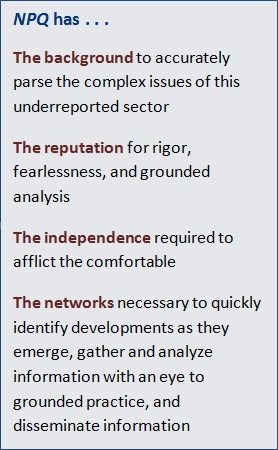 NPQ is based on the idea that we will build the intelligence of the sector through the intelligence of the sector. This requires that we work with a large number of you to build our collective understanding of stories that are emerging over time. This allows us to raise and address questions about, for instance, the changes in the relationship between governments and nonprofits, the new forms of organization made possible through technological advances, the permutations of ideas on social enterprise (and what that conversation means), and the ways in which movements are organizing their work differently—just to name a very few.
NPQ is based on the idea that we will build the intelligence of the sector through the intelligence of the sector. This requires that we work with a large number of you to build our collective understanding of stories that are emerging over time. This allows us to raise and address questions about, for instance, the changes in the relationship between governments and nonprofits, the new forms of organization made possible through technological advances, the permutations of ideas on social enterprise (and what that conversation means), and the ways in which movements are organizing their work differently—just to name a very few.
“I read my e-mail version of NPQ every day. This is where I get my news first. This is where I become inspired. This is where I learn about things that keep me up at night. I cannot imagine being a part of the nonprofit community (or any community of intelligent, informed readers) that did not included NPQ’s news, opinions, and insights. Giving makes me a partner? I’m honored, will continue to support
NPQ.”
—Eugene Fram, NPQ Community Member and Donor

THERE ARE MORE OF YOU THAN THERE USED TO BE BUT
LESS OF YOU THAN THERE SOON WILL BE
NPQ’s community is steadily growing. NPQ’s annual unique visitor numbers increased 111% in 2011 over 2010, and 49% in 2012 over 2011. Our unique visitors in 2012 numbered 671,919, exceeding the projections we had made for 2013. We have even higher ambitions for reach over the next few years.
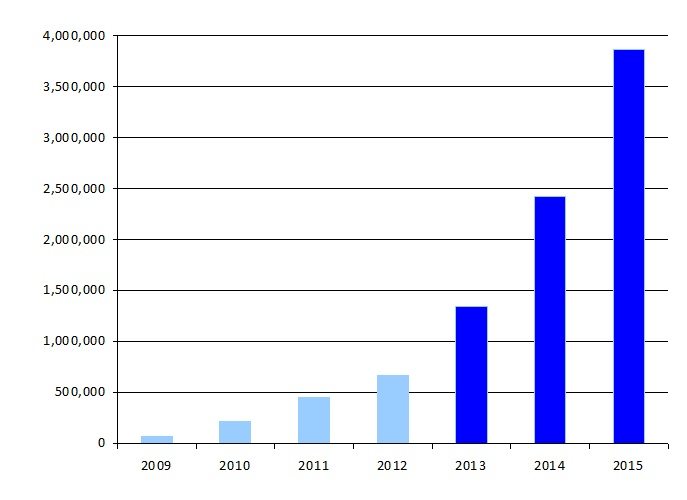
PROJECTED
NPQ’S READER SURVEY
Every year, NPQ conducts a survey of its readers, the information from which informs our work in a myriad of ways. But we do not just survey you. We do not just ask about how we can improve but also, and more important, about what you are experiencing in your work—BECAUSE IT IS YOUR EXPERIENCE THAT INFORMS US AND DRIVES US TO PURSUE PARTICULAR QUESTIONS.
This year we were so grateful for the 937 in-depth responses we received—some from as far away as New Zealand. The big news is, as always, that the guidance we get from our readers is deeply grounded, prescient, multidisciplinary, and well-informed—and that makes NPQ a much smarter publication.
FROM THE 2012 SURVEY: NPQ READERS—WHO YOU ARE
There are three categories of NPQ readers: those who read us often, with some contributing content and/or financial support; those who visit from time to time; and those who are interested in some individual story that has crossover appeal. That first category is our closest and most constant community, and we are always trying to grow it through engagement with you. We see each individual in that community as a node of a network, capable of gathering and disseminating information about what is occurring in and around the work of nonprofits, philanthropy, and the civil sector in general. That vision of a many-noded network is what makes NPQ a powerful source of useful, prescient information.
NPQ’s readership community is a remarkable cross-section of the sector—representative of major subsectors or fields of work and of various budget sizes. If you look at the graph on budget size you will find that close to half of our readership works with organizations that have annual budgets of less than $1 million.
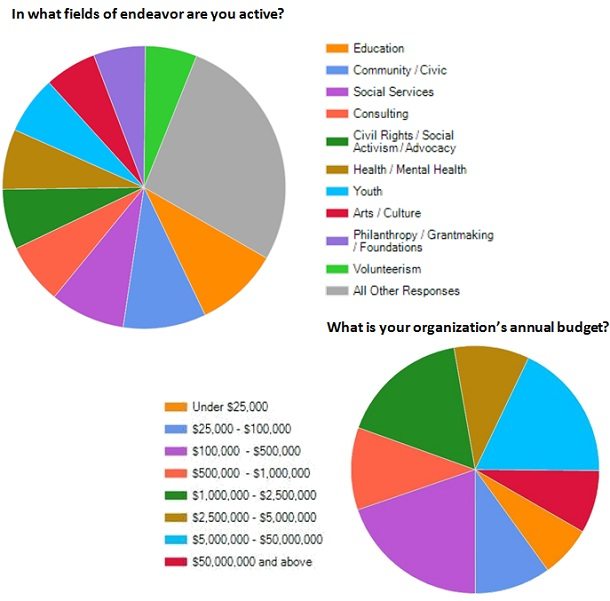
FROM THE SURVEY: A VERY SMALL SELECTION OF THE VAST AMOUNTS
OF GUIDANCE YOU GAVE US ON TRENDS TO BE TRACKED IN 2013
- The rapidly growing world of social media is presenting unprecedented and challenging opportunities for nonprofits. We are still sorting out the ways that nonprofits will have to reach out to and communicate with their multiple constituencies. This is especially interesting in the fund development process. Permanent shifts in government funding will require nonprofits to rethink their strategies for revenue generation from the ground up.
- We all need to keep up with the intense focus of citizens on how best to coalesce talents and energies around significant issues such as the rise in sea level and violence involving the use of guns.
- People talk about having a systemic point of view and a networked approach but still seem bogged down by the technical and adversarial.
- How are rural economic development programs changing? What is going on with healthcare delivery in rural areas?
- Power has shifted. The old adage that “information is power” applies, and everyone has access to the information. Folks can find out about us by searching, reading Yelp reviews, and monitoring Twitter and FB chatter, so they’re often two thirds down the path toward potential engagement before we even know they exist. This means we have to change our outbound monologues about how great we are and how great the need is to inbound multi-person conversations.
- I work in community arts, and we are seeing a huge change in funding from project based to community based. Silos are being broken down, and nonprofit and for-profit lines are blurring. There is a greater potential for arts organizations to be more critical and involved in their communities than ever before, but it is a difficult transition for many.
- How will the implementation of the Affordable Care Act impact various parts of the nonprofit world? Are there some innovations for financing affordable housing since tax credit dollars are drying up?
- We need more stories of hope and re-invigoration in “how to” form.
- Thinking or working on new ideas about nonprofit capital . .
- What are the changes in corporate giving?
- Ideally, I want both landscape articles (how a broad issue like board development or revenue generation is changing across the sector) and then what is happening in different service fields. I would love NPQ to both respond to the trends and cycle through the big management categories at set intervals (so that the landscape analysis can be updated every two to three years).
FROM THE SURVEY: A VERY SMALL BUT REPRESENTATIVE SELECTION
OF WHAT YOU SAID ABOUT LAST YEAR’S COVERAGE
- NPQ is always two steps ahead of the other resources that I reference.
- I appreciate getting national perspectives on things I am dealing with locally.
- Honest, hard hitting, and doesn’t beat around the bush. NO B.S.
- The topic selection is unlike anything else I read—a broad area both in terms of topic and geography.
- Your level of sophistication separates you from the pack.
- NPQ really distinguishes itself by raising complex and uncomfortable moral, ethical, and pragmatic issues.
- NPQ possesses deep connective tissue to the many threads of life that have informed this field.
- NPQ is notable for its well-researched, data-based information.
- [NPQ does] analysis of issues directly and indirectly affecting nonprofits—often issues that are not even considered until being brought to the reader’s attention by NPQ. It has a bit of a jaundiced approach, which I like.
FROM THE SURVEY: THE WORDS YOU MOST OFTEN USED TO DESCRIBE NPQ
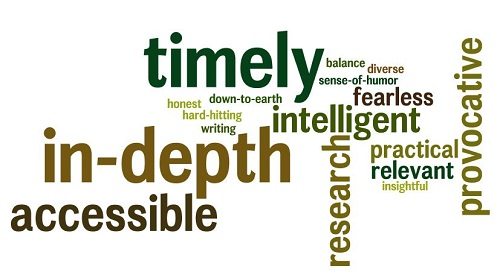
NPQ NEEDS YOUR FINANCIAL SUPPORT
NPQ IS GUIDED BY A BUSINESS PLAN THAT ALIGNS OUR PUBLISHING MODEL TIGHTLY WITH OUR REVENUE MODEL.
NPQ’s New Business Hypothesis
NPQ‘s business model concentrates on the growth and engagement of our community of reader/participants. Our theory is that this engagement will guide and feed editorial content and create a sense of ownership that will cause readers/participants to financially support NPQ.
What NPQ accomplished in 2012
- NPQ’s growth in “renewable income” more than doubled from $287,000 in 2011 to $659,000 in 2012, and it covered approximately 65% of our expenses as compared to approximately 30% the previous year;
- Our advertising increased from $95,285 in 2011 to $179,611; and
- The growth in donations from individual readers (YOU) was $11,376 in 2011 to $53,523 in 2012.
THIS YEAR WE NEED TO INCREASE READER DONATIONS TO AT LEAST $75,000
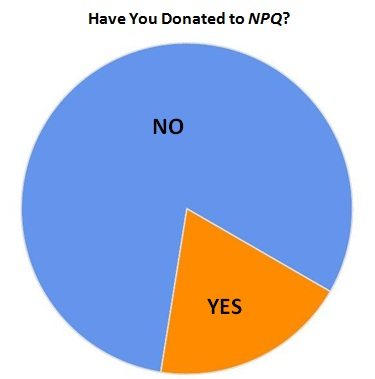
This graph indicates, in blue, those who answered the 2012 survey but have not yet given to NPQ. We have to fix this. Those of you blue people who have not yet donated to us may not understand that NPQ functions much like public TV and radio—we need your donations to produce quality media in synch with your interests and needs—except we do not have even a small slug of cash from government. YOU are who govern NPQ.
‘‘In these days of lowest common denominator media coverage, it’s more important than ever to support journalists and commentators who understand the third sector and can bring a clear-eyed view of implications of policy, politics, and current events.’’
—Cynthia Silva Parker,
Community Member and Donor
The deep knowledge that NPQ wields about the sector wed with editorial independence allows NPQ to parse the complex issues faced by 21st century civil sector activists quickly and intelligently. This capacity of clearly differentiates NPQ from its competitors.
IT IS YOUR INVOLVEMENT AND SUPPORT OF NPQ THAT KEEPS IT RESPONSIVE TO YOUR INFORMATION NEEDS.
NPQ THANKS ITS 2012 DONORS
More than 400 individuals gave to NPQ last year. If you look through the list, below, you will likely see some familiar names.
The average gift was $101.
This year we need to increase the number of our donors by at least 50%, and we need our donors to increase their gifts by at least 25% to make sure that we reach our goal. We need 644 donors!
Last year our highest gift from an individual was $2000.
Individuals
|
Athena Aardweg Alan Abramson Brent Akright Michelle Alexander Ivye Allen Michael Allison Audrey Alvarado Adele Amodeo Judy Anderson Beverly Armstrong David Arons Thomas Atlee Nancy Bacon Suzanne Bader Allen Baldwin Susan Barker Shannon Barnes Kathleen Barnett Kate Barr John Bartlett Morgan Baum Sandra Beaver Bruce Beckham Charles Bell Lehn Benjamin Lucy Bernholz Leyna Bernstein Mark Bertler Theresa Beyerle Mary Beth Bingman Parri Black Robyn Blackwell Elizabeth Boris Paul Bothwell Anne Bowhay H. Woods Bowman William Boyd Lisa Brachman Catherine Bradley Kristin Bradley-Bull Angelica Braestrup Jennifer Brandon Ann Breihan Richard Brewster Temmie Brier Jessica Broeckling Allen Bromberger Kathleen Brown Pamela Brown Margaret Brown Mary Brumbach Mitch Bruski Eric Buch Phillip Buchanan Barbara Burnham Melissa Busch Yolanda Cabassa Robin Callahan Chip Carlin Margot Carlson Susan Carter Alexandra Cartra Ellis Carter Betsey Chace Kathy Chamberlain Lisa Chapnick Laura Chasin Steve Clem Brad Clements Isabelle Clerie John Clinton Stephanie Clohesy Danielle Clore Colleen Coffey Chuck Cole Rachel Coleman Stuart Comstock-Gay Richard Cook Marla Cornelius Anne Cory Stephanie Cotsirilos Christena Coutsoubos Kathleen Crompton Christy Crosser Carlo Cuesta Lucille Dabney Anne Dalton Kathryn Daugherty Carrie Dauner Thomas David Allison Deinse Tim Delaney Thomas Dente Kathleen Desilets Margaret Donohoe Aaron Dorfman John Dorger Courtney Dunleavy Donna Dziak Lynn Eakin Penny Eardley Michael Edwards Ken Egan |
Anne Eigeman Brian Evans Gloria Ann Evans Erzsebet Fazekas Echo Fields Dennis Fischman Glenda Fishman Derek Floyd Elaine Fogel Saoirse Folsom John Ford Jeff Forster Cheryl Fox Eugene Fram Jason Franklin Shelly Franz Brian Fraser Judy Freiwirth Lara Friedman Amy Friedman Cecil S. Fryberger Mark Fulop Emily Furlong Richard Gabel Liz Georges Cynthia Gibson Gayle Gifford Kendal Gladish Don Gomes Jennifer Goodman Wanda Gottschalk Douglas Gould Michael Graff-Weisner Monica Grant Jan Gray John Griswold Dorie Guess Behrstock Chao Guo Maria Gutierrez Scott Gutterman Becky Haines Tullia Hamilton Susan Hammond Denise Harlow Lee Harper Scott Harshbarger Michael Hatzenbeler Jennifer Hauge Liz Heath Christie Hedman Mary Heffernan Richard Heitler Anne-Marie Hendrickson Kristi Anderson Hermann Stephen Hermes Toni Hirst Suzanne Hoban Virginia Hodgkinson MaryAnn Holohean Stacey Howard Andrea Howe Monica Hubbard Sandra Hughes Claire Hundelt Erica Hunt Mamie Hutt Temoana Margaret Huyck Heather Iliff Jean Ingebritsen Franklin Ingram Kathleen Jaworski Tifany Jeffers Marianne Johnson Tamara Johnston Valerie Jones Ruth Jones William Josephson Simone Joyaux Sign up for our free newslettersSubscribe to NPQ's newsletters to have our top stories delivered directly to your inbox. By signing up, you agree to our privacy policy and terms of use, and to receive messages from NPQ and our partners. Ira Kaminow Kori Kanayama Laurence Kaplan Jerold Kappel Joy Keenan Brooks Kelley Michael Kenyon Erwin Kerr Ken Kessler Judith Kidd Kelly Kleiman Chris Knife Margot Knight Dennis Kumer Frances Kunreuther Lynn Labieniec Didi Lacher Valyrie Laedlein Heather Laird Carol Lamm Gary Landwirth Frederick Lane Patricia Larson
|
Robert LaVallee Janet Lavoie Gerry Lawless Gregory Lease Elaine Leichter Mindy Leiterman Jane Lennox Catherine Lepone Jan Lepore-Jentleson Marci Levin Steve Lew Pat Libby Mark Light Terry Limpert R. Ruth Linden Margaret Linnane Deborah Linnell Lawrence Litvak Steven Long Mark Loranger Marci Lu Maria Mandel Paula Manley Christine Manor Patricia Mapp Lewis Margolis Frank Martinelli Jan Masaoka Terry Masters Don Mathis Steven Mayer Ted McEnroe Nancy McGee Renee McGivern Susan McGuire Kim McGuire Robyn McIntyre Robert McKay Melissa Mendes Campos Gary Miller Clara Miller Ricardo Millett Barbara Milon Kathleen Mitchell Eric Mitchell Patricia Mogan Char Mollison Marianna Moore Marci Moore Liz Moore Fran Morris Meg Mullen Lisa Munderback Sara Munro Cherry Muse William Musick Fraser Nelson Pat Nichols Jane Nolan Deborah Obalil Keith Oberg Mary Ogden Barbara Olson Alexander Ong David Osborne Bonnie Osinski Laura Gassner Otting Thomas Packard John Pannell Emile Paradis Jeffrey Parker Susan Burgess Parrish Cindy Patterson Edith Patterson Rick Pavich Janna Pederson Brenda Peluso Seth Perman Joan Perry Gail Perry Ron Phillips Amelia Pickering Laura Pierce Kathleen Pierce George Pillsbury Elaine Pinson Elisa Pluhar Rebecca Plunkett Regina Podhorin-Zilinski Tom Pollak Lonnie Powers Kate Prevra Jon Pratt Jeff Prauer Wendy Puriefoy Joan Pynes Susan Radwan Rip Rapson Patricia Read Janet Rechtman Margaret Reid Andrea Reynolds Dennis Rice
|
Sarai Rice Dot Ridings Allison Riese Robert Ringstad Andy Robinson Sydney Roberts Rockefeller Lissette Rodriguez Robin Rogers Mike Rohan Adam Roozen Sandra Rosenblith Helen Banks Routon Steven Ross Albert Ruesga Barbara Rusmore Laura Henze Russell Anne Ryan Pat Ryan James Ryczek Shabbir Safdar Mary Saionz Kathleen Samilo Katherine Sandweiss Rina Saperstein Leslie Scallet Lieberman Dana Schaar Dolores Schaefer Claudia Schaefer William Schambra Michelle Scheffki Buzz Schmidt Elizabeth Schmidt Kathrine Schroeder Robyn Schwartz Christine Sculati Jennifer Shahan Jack Shakely Richard Shaw Paula Shoecraft Benjamin Shute Mark Sidel Claire Silberman Cynthia Silva Parker Barry Silverberg Dan Sise Jimmy Skiba Edward Skloot Roberta Sladky Amy Smereck Jullaine Smith LeAnn Smith Leila Smith Della Stanley-Green Jonathan Stansell Mary Stelletello Irene Sterling Gary Stern Richard Stevens Nan Stone Andrea Swart Jennifer Talansky Molly Talbot Dimitra Tasiouras Belinda Teitel Linda Terrell Jamie Thomas David Thompson Peter Thompson Carolyn Tisdale Felix Torres-Colon Eileen Heisman Tuzman Joan Ustin Amanda Valenzuela Paula Van Ness Beth Vann-Turnbull Robin VanOss Lisa Verlinger Mathew Vicknair Stephen Viederman Lorelei Villarosa Albert Wallis Elaine Walsh Louise Warner Joe Waters Bobby Watts Charlene Webster Paco Wertin Trina Westerlund Donna Wiedeman Lori-Anne Williams Maureen Williams Janice Williams Eugene Williams Garth Winckler Wendy Wintermute Peter Woodbury Abigail Woodworth E G Works Ron Wormser Patricia Wyzbinski Bill Young Nikki Zeuner Carol-Lynn Zurek
|
Foundations
|
Boyce-Mansfield Charitable Gift Fund Eastern Bank The F.B. Heron Foundation Foundation for the Mid South The George Gund Foundation Meyer Foundation
|
Charles Stewart Mott Foundation Rockefeller Brothers Fund Silicon Valley Vermont Community Foundation The Wallace Alexander Gerbode Foundation The William and Flora Hewlett Foundation |
Organizations
|
Center for Strategic Philanthropy and Civil Society CompassPoint Nonprofit Services Management Assistance Group |
National Arts Strategies Strategic Philanthropy, Ltd. Young Nonprofit Professionals Network |
NPQ ‘s Board of Directors
Ivye Allen, President, Foundation for the Mid South
Charles Bell, Programs Director, Consumers Union
Jeanne Bell, CEO, CompassPoint Nonprofit Services
Jim East, Consultant, George Kaiser Family Foundation
Chao Guo, Associate Professor & Director of
International Programs, SPEA at IUPUI
Buzz Schmidt, Principal, Building Wherewithal
Richard Shaw, Chief Development Officer, Youth Villages












